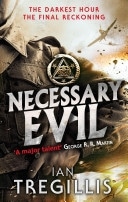Necessary Evil (The Milkweed Triptych novels book 3) by Ian Tregillis (book review).
Just when you thought ‘The Milkweed Novels’ couldn’t possibly go any further, a third one comes along. The older Raybould Marsh has been given an assisted time travel back to 1940 determined to change the past both stopping the Nazi school and getting the warlocks involved which will the end of the world. This is helped in part because the wired German Greta who can see the future and, while in the UK, sees the implication for herself and her own fate. This doesn’t make her perfect but telling you too much of that is spoiler. The elder Marsh succeeds in sending her and his younger unknowing self to close down the school permanently that created them. It’s inevitable that he gets close to his younger self’s wife and daughter but acts with restraint but ultimately, knowing their fate, serves to protect them.
I should point out that this is not just a reworking of book one, ‘Bitter Seeds’, as there’s so much that is different. The older Marsh has to manoeuvre without being seen although things don’t always go to plan and he wasn’t there the first time around. Giving you precise details is definitely spoiler but you should have the gist of the plot from above.
The action in the final chapters does jump around a bit too much between events happening at the same time and tends to lose out in the emotional content and could have been controlled better.
Unlike his previous two novels, author Ian Tregillis focuses a lot of the opening of this novel, ‘Unnecessary Evil’, in wartime London and mistakes from poor research of the setting seep in. We British never call wallets ‘billfolds’ was the start of the rot. The problem with currency that Marsh had would have been bigger because 1960s sterling paper money was actually smaller than that in distribution in WW2. Unlike the Americans, our money was never the same size. In fact, we find it odd why you would want a dollar bill the same size as a one hundred dollar bill which must surely confuse your sighted as well as blind folk. There was definite different sizes of British sterling money even more so in WW2 but shrinking them down later but still keeping size ratios. Likewise, Tregallis’ idea of taxi charges in that time period are, to put it mildly, far too extravagant. The taxi driver would have thought him far too extravagant with the tip. Remembering what I know about security cards, they also aren’t supplied with photographs on them neither in that time period. Anderson Shelters weren’t particularly big neither. Just big enough to snuck a family in with little space to move and not all houses had them, especially in London, where the Underground was thought to be a lot safer.
Despite all of this, ‘Necessary Evil’ is actually a good read and although some events extend some of the chapters unnecessary long, leaving you in a dilemma to finish reading or take a break, it keeps the pace up.
It’ll be interesting to see where Tregillis will go after this trilogy as he can only get better.
GF Willmetts
(pub: Orbit. 470 page small enlarged paperback. Price: £ 8.99 (UK). ISBN: 978-0-356-50171-0)
check out websites: www.orbitbooks.net and www.iantregillis.com

